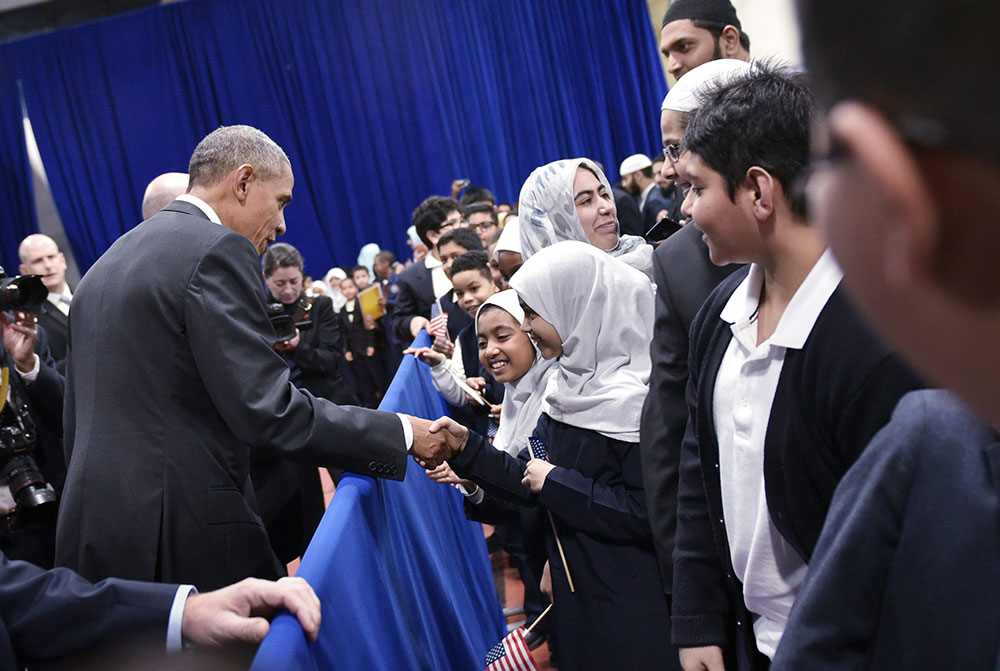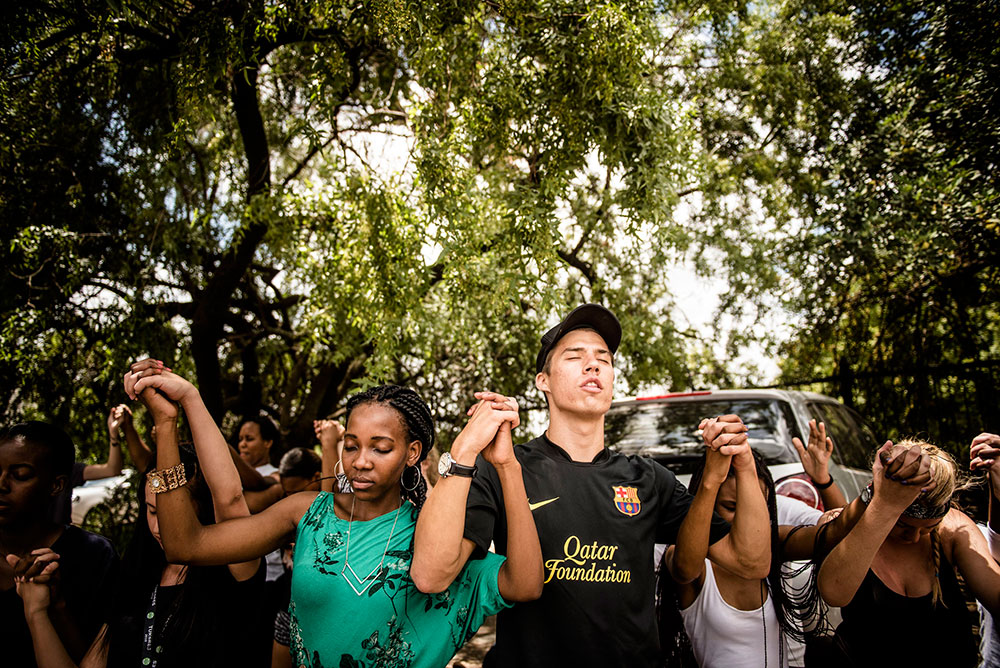Religion has always played a big role in the United States polls.
When sung in earnest, the South African national anthem feels ethereal. And perhaps it’s because it’s religious: Nkosi Sikelel’ iAfrika was a hymn before it became the musical score for our delicate democracy. In a country where citizens proudly start the anthem with “Lord bless Africa”, the power of religion still seems to be underestimated.
At a noisy petrol station in Daveyton on the East Rand, a taxi driver pulls up. His minibus is blaring kwaito, but it’s failing to compete with the church next door. Two large speakers stand outside the Daveyton Theatre, which is now a church. It used to be a cinema where black South Africans found an escape from apartheid’s harrowing reality in Hollywood films. The seats are still there, neatly arranged in concave rows, facing what was once a screen but is now a pastor’s platform.
The old, battered theatre resonates on a global scale. No matter the changes a country undergoes, the presidents who rule it, the parties who come to power and the differences as societies evolve, religion is a constant. The power of religion lies in its influence, through the followers who band together around leaders who share their beliefs. It’s common in communities of all faiths and, although often subtler, it’s common in politics too.
“Render unto Caesar the things that are Caesar’s and unto God the things that are God’s” is a popular maxim attributed to Jesus.
Although many read it as the original demand for the separation of church and state, historian Karen Armstrong writes that it reveals the way in which religion and politics should coexist. But in a world where Western values have sanctified secular politics, religion has become enmeshed in global current events in a dramatic way.
“As an inspiration for terrorism … nationalism has been far more productive than religion,” writes Armstrong in her book, Fields of Blood: Religion and the History of Violence.
Post-9/11, Islam has almost become synonymous with terrorism. But the goals of many of these violent organisations are more political than religious. Both Islamic State and Boko Haram are fighting for power, control and land. Their ruthlessness and thirst for power isn’t far from the inhumane pursuits of colonialism and its battle for empire. Just as colonialists used Christianity as a means to attain their ends, the violence ripping through parts of the Middle East and North, East and West Africa is built on political views that use religion to validate their actions. Are Islamic State or Boko Haram truly representative of Islam? And what of the discord that brews between Muslims and Jews when a conversation turns to Palestine and Israel – does Islam or Judaism have anything to do with the political occupation of land?
Ironically, despite the West’s commitment to the separation of church and state, spirituality still plays a significant role in Western politics. In the United States, religion is a moral compass of presidential proportions. A January 2016 survey by the Pew Research Centre found that, although believing in God isn’t as important as it has been in previous years to US voters, half of that country’s adult population would not vote for an atheist president.
“Being seen as a religious person is generally an asset for candidates; people who think a candidate is a religious person tend to be more likely to see that candidate as a potentially good president,” the survey said.
Two of the US’s most talked-about politicians evoke the religious sentiment tied to political branding. Donald Trump – the chosen one for every racist, sexist, homophobic, conservative Republican – announced last year that he is Presbyterian. He also identifies himself as an evangelical, which makes him a hot vote for Republicans who often favour politicians with such beliefs.
By appealing to the Christian vote – even going so far as to film a video with the Bible he says his mother gave him – Trump has grounded his presidential campaign firmly in Christianity.
The current US president, Barack Obama, has been the subject of several religion conspiracy theories since he took office in 2008. Despite him saying that he is a practising Christian, rumours that he’s a closet Muslim, has the middle name “Mohammed” and is the Antichrist have trailed him throughout his presidency.
After years spent avoiding mosques, Obama visited his first one – the Islamic Society mosque in Baltimore – in February, where he emphasised that Muslims have a valid place in American society and hate crimes against them should be condemned.

Having previously avoided mosques, President Barack Obama visited the Islamic Society of Baltimore mosque in February. (Mandel Ngan/ AFP/ Getty Images)
Although the gesture won him some fans in the Muslim community, critics posed a vital question: why did Obama avoid mosques until now? The answer probably lies in the idea that associating his political brand with Islam when he was still reliant on voter sentiment would impact negatively on his presidency.
The strength of Christianity is undeniable in the US. Even the economy is influenced by the church. A case in point is the mass adoption of the prosperity gospel, which has at its heart the premise that God wants his followers to be wealthy and comfortable in this life.
“You don’t have to say: ‘God, bless my business. Bless my bank account.’ The blessings will come! The blessings are looking for you! God will take care of you. God will not let you be without a house!” Pastor Fernando Garay, from the Casa del Padre church in Virginia, preached in 2009.
This false sense of entitlement is often cited as a contributing factor to the US’s subprime housing crisis in 2008. Pastors encouraged their congregations to buy into a credit system because God wanted them to “prosper”.
When the housing bubble collapsed, they were left with unaffordable mortgages, leading to mass foreclosures and one of the worst recessions the US has experienced.
Religion is believed to empower the poor and the prosperity gospel perhaps had that intention but failed to give good counsel.
Although religions devote themselves to equality, some people may find themselves excluded from spiritual spaces because they are too poor or too black.
In South Africa, this is obvious in the #Colourblind movement, which aims to see “no race but the human race”. It was founded by youth church movements in Pretoria, where students believe nonracialism is the perfect answer to protesting black students fighting for equality.
It was jarring to see photographs of students, both black and white, their faces contorted with emotion, hands raised to the heavens, praying for peace when riot police were firing on black protesters.

University of Pretoria students pray for peace. (Nelius Rademan, Beeld/ Gallo Images)
Prayer has often been linked to peace, but many religions, such as Islam and Judaism, were forged in violence because they disrupted the status quo. We may yet, generations down the line, get to a place where nonracialism can finally be accepted – perhaps when more people begin to accept that Jesus could have been a brown man.
For the most part, however, South Africans can count themselves fortunate to live in a country where they are free to practise and express their beliefs. It’s in the beauty of Sundays, when families stream through the streets in their Sunday best after a morning in church.
It’s also in the freedom of Fridays, when Muslims spill from mosques on to the pavements, kneeling in prayer as people respectfully walk around them. A synagogue can exist a few short metres from a temple, and an atheist is free to state his or her beliefs without state persecution.
Freedom to believe is at least one of the aspects of our Constitution that seems to be working. South Africa’s ruling party, the ANC, was founded in a church where some of its first members were clergymen, and still today we sing Nkosi Sikelel’ iAfrika.
The power of religion didn’t wane in the age of secularism.
Instead, it is now subtly wielded to influence debate. Religion is often sidelined in the public consciousness – which makes it all the more important for us to take it seriously.
Ra’eesa Pather is a Mail & Guardian reporter.